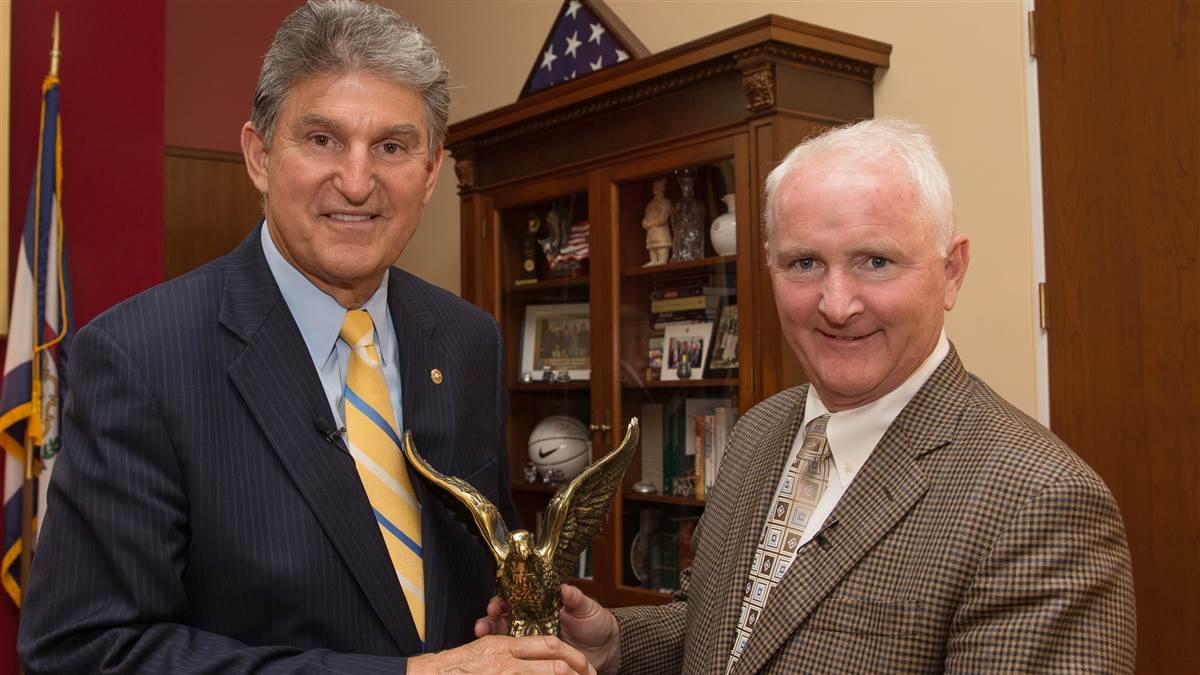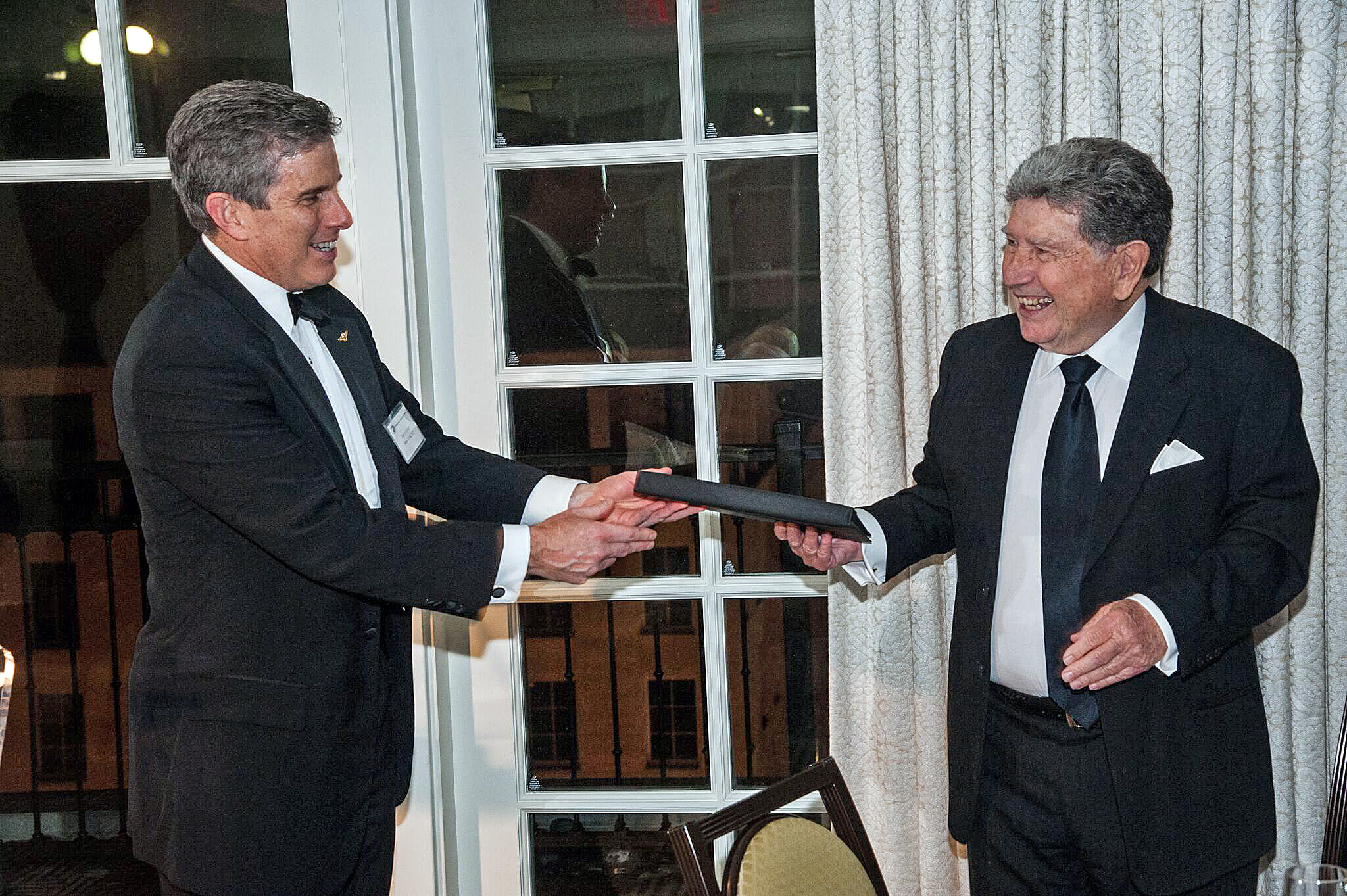Awards
Sens. Inhofe, Manchin honored with Hartranft Award

General Aviation advocates Sens. James Inhofe (top) and Joe Manchin (below) accepted the Hartranft Award, one of AOPA’s highest honors, from AOPA President Mark Baker.
 What does GA mean to you?
What does GA mean to you?
Manchin: As a pilot myself and co-chairman of the General Aviation Caucus in Congress, I have always been passionate about the issues that affect the aviation community. It is a top priority of mine to address the unique challenges faced by the general aviation sector, and to foster business growth and job creation through this growing industry.
Why do you think third class medical reform is so important?
Inhofe: The FAA’s medical certification process is bureaucratic and burdensome. It subjects recreational pilots to long wait periods and repeated testing after the most routine of medical procedures. In addition, recreational pilots are often told they are not allowed to fly, despite the fact they have been successfully treated for medical diagnoses. This has discouraged pilots from disclosing and treating medical conditions because they fear the FAA’s punishment. The Pilot’s Bill of Rights 2 reforms the medical certification process by untwisting this process. Rather than rely on FAA doctors—who do not know the pilots—to evaluate medical airworthiness based off of a paper trail, the reforms place these decisions in the hands of pilots and their personal doctors. Through robust medical education requirements and mandated medical examinations, the reforms will encourage pilots to more aggressively treat medical conditions instead of hiding them, which will make our skies safer. Third class medical reform could impact more than 230,000 recreational pilots immediately and will ensure that all pilots are safely able to spend more time flying and less time fighting with bureaucrats at the FAA.
What is the reaction when you try to advance GA causes in Congress? How do other members view the industry? Is GA a bipartisan issue?
Manchin: General aviation is certainly an important issue in Congress, and is one of the few topics that truly brings both sides together. Furthermore, each member has a unique story to tell about the positive benefits the industry has on the communities in their state. My colleagues in Congress understand that general aviation is key to driving economic growth—providing crucial services such as emergency medical evacuation, agricultural aviation, and more. I trust that we will continue to work in a bipartisan way with the focus on supporting the industry.
What are your thoughts on the compromise to the Pilot’s Bill of Rights 2, and what types of pressures led to that compromise?
Inhofe: The Pilot’s Bill of Rights 2 is a bill that started with input from pilots I met across Oklahoma and at fly-ins around the country. We had tremendous support from the entire general aviation community from day one. Pilots across the country contacted their members of Congress, telling them how important this bill was to them. That support galvanized Congress to move forward with the Pilot’s Bill of Rights 2, getting it through committee and onto the Senate floor, where it passed by unanimous consent. Getting to this point required modifying the original language to address concerns that arose in the process—but this is the kind of thing that happens to every bill, particularly in the Senate, where most things must be done by unanimous consent. Fortunately, the changes were minor and keep pilots and their private doctors in the driver’s seat of all but the most serious and complicated medical questions. These reforms are very good for general aviation.
How do you think GA benefits the country?
Manchin: General aviation plays a vital role in the nation’s transportation system, generating more than $150 billion in annual revenue, sustaining 1.3 million jobs and supporting 5,000 airports nationally. The industry is one that builds strong relationships in the fabric of our cities and towns—allowing pilots to come together with their family and friends to experience the wonders of flight.
What do you see as Congress’ role in ensuring the future of GA?
Inhofe: In an environment where the number of general aviation pilots continues to decrease every year, Congress should focus on reducing the regulatory hurdles that people face in trying to get and stay in the air. In 2013, Congress passed legislation that I co-sponsored, the Small Airplane Revitalization Act, which modernized FAA regulations on small aircraft. Just this year, Congress included language in an appropriations bill that will ensure that FAA maintains strong engagement with industry stakeholders (such as AOPA), which is key to eliminating bureaucratic delays facing pilots. These have been bipartisan because general aviation issues cut across ideological divides, which is good for everyone.
“My colleagues in Congress understand that general aviation is key to driving economic growth—providing crucial services such as emergency medical evacuation, agricultural aviation, and more.” —Sen. Joe Manchin (D-W.Va.)
“Third class medical reform could impact more than 230,000 recreational pilots immediately and will ensure that all pilots are safely able to spend more time flying and less time fighting with bureaucrats at the FAA.”
—Sen. James Inhofe (R-Okla.)
Endeavor Awards
Public benefit flying feted at annual awards
Third annual Endeavor Awards honors charitable flying
By Julie Summers Walker

Dick Rutan accepts the 2016 Inspiration Award.
It wasn’t the Hollywood star-studded event it has been in the past, but the third annual Endeavor Awards held in Denver during May featured aviation’s stars, and that was enough for the enthusiastic crowd of pilots and their patients.
The Endeavor Awards, originated by California pilot and Hollywood producer Mark Wolper, honor pilots for their work in charitable flying—from pets to patients, veterans, and others in need. Wolper began the event as part of his own charitable work with Angel Flight West, which hosted the event in the Denver Museum of Nature and Science. Situated overlooking Denver’s spacious city park, the gala had music, entertainment, awards, and a few tears.
Receiving the 2016 Inspiration Awards were inventor and visionary pilot Dick Rutan and pilot of Bell 407 Prayer One Jeffrey V. Puckett. Rutan entertained with stories of his exploits, adventures, and legendary flights. And, as he usually does, he admonished his listeners always to be striving for the next adventure; he is still pushing for space exploration and life outside the Earth’s atmosphere. He received standing ovations for his words.
Every Monday morning, helicopter pilot Jeff Puckett provides rides over Denver for ministry leaders, to encourage interfaith work in the region. He has flown more than 6,000 community and religious leaders, including opposing gang members. He told the story of one young gang member who was frightened of heights—his mother’s boyfriend had threatened him as a child by hanging him by his feet over a building ledge—who was transformed by seeing his city from the air.
The three 2016 Endeavor Award winners were introduced by Denver television personality and pilot Amelia Rose Earhart. She was joined by Charlie Plumb, a former Navy fighter pilot and prisoner of war from the Vietnam War era. Honored for his work with Veterans Airlift Command was retired U.S. Air Force Col. Richard Iverson. He is active with Jeffair providing air transportation for medical or compassionate reasons to wounded U.S. soldiers, veterans, and their families. He lives in Guemes Island, Washington.
Patient AirLift Services pilot Jim Platz of Maine has flown more than 5,000 missions for PALS and other volunteer organizations including AirLifeLine, Northern Wings, Angel Flight Northeast, Make A Wish Foundation, and the Maine Audubon Society.
“The Most Dedicated Female Pilot in the World,” according to the Institute of Women of Aviation Worldwide, is Dianna Stanger. In addition to the work she does to promote flying to women and girls, Stanger is the chair of Angel Flight South Central.
The highlight of the Endeavor Awards is meeting the recipients of these charitable flights and hearing their stories. Patient Adrian Duranfrom Santa Fe, New Mexico, thanked Stanger for flying him to UC Denver for his liver transplant and post-transplant procedures. Also on hand were patients Riley Stump, a 14-year-old boy with sunken chest; Zavien Chavez-Valdez, a 6-year-old burn survivor; and Tracey Black, a 55-year-old woman with Lyme disease. Zavien stole the show—and the hearts—by saying thank you to all of the volunteer pilots.
“It’s such a humbling experience to be surrounded by such an amazing group of courageous patients, aviators, philanthropists, and celebrities tonight,” said Josh Olson, executive director of Angel Flight West. “We hope the Endeavor Awards can serve as a platform for raising support and awareness for charitable aviation so that we can reach more people in need of donated flights.”
An auction concluded the evening with money raised to support the work of benefit flying.
Email [email protected]
Record-setting scholarships awarded
Able Flight, the North Carolina-based organization that supports flight for people with disabilities, has entered its tenth year and has awarded a record-setting eight scholarships for 2016. The recipients come from throughout the country and face challenges from a variety of physical disabilities—seven people who use wheelchairs because of the effects of injuries, and one who is deaf.
Receiving scholarships are Johnny Ragland and Justin Falls of North Carolina; Ethan Daffron of Indiana; Scott Earley of Florida; Shafeeq Moore of Georgia; Bernard Dime of Arizona; Trevor Denning of Texas; and Shavon McGlynn of New York. They will train at Able Flight’s campus at Purdue University.
“When I have the pleasure of calling to notify applicants of their awards, I tell them that they are about to embark on a journey that will change their lives forever,” said Charles Stites of Able Flight. “Our program is demanding and challenging, and that’s because we work with our partners at Purdue’s Department of Aviation Technology to make it so. When our students become licensed pilots, they know they have earned it.”
Graduates will be awarded their Able Flight Wings at EAA AirVenture July 26.
Web: www.ableflight.org
Yodice honored with Lifetime Achievement Award
 The International Air and Transportation Safety Bar Association (IATSBA) has honored AOPA Pilot columnist and former AOPA General Counsel John S. Yodice with a Lifetime Achievement Award. The IATSBA was founded in 1984 to represent the interests of attorneys across the globe who practice before the NTSB, Department of Transportation, the FAA, and the Transportation Security Administration. Yodice is a founding member and serves as the board’s secretary. He graduated from the George Washington University Law School in 1959 and founded his private practice to represent pilots, flight schools, corporate and commercial operators, aircraft owners, and others in a broad range of aviation law matters. In addition to serving as general counsel to AOPA, Yodice was also general counsel to the International Council of Aircraft Owner and Pilot Associations. He is a director and past president of the Lawyer-Pilots Bar Association. He uses his Cessna Turbo 310 primarily for his law practice—Yodice Associates, with his son Michael and daughter Kathy—and flies his Piper Cub for fun. A gala dinner was held in his honor at the Hay-Adams Hotel in Washington, D.C.
The International Air and Transportation Safety Bar Association (IATSBA) has honored AOPA Pilot columnist and former AOPA General Counsel John S. Yodice with a Lifetime Achievement Award. The IATSBA was founded in 1984 to represent the interests of attorneys across the globe who practice before the NTSB, Department of Transportation, the FAA, and the Transportation Security Administration. Yodice is a founding member and serves as the board’s secretary. He graduated from the George Washington University Law School in 1959 and founded his private practice to represent pilots, flight schools, corporate and commercial operators, aircraft owners, and others in a broad range of aviation law matters. In addition to serving as general counsel to AOPA, Yodice was also general counsel to the International Council of Aircraft Owner and Pilot Associations. He is a director and past president of the Lawyer-Pilots Bar Association. He uses his Cessna Turbo 310 primarily for his law practice—Yodice Associates, with his son Michael and daughter Kathy—and flies his Piper Cub for fun. A gala dinner was held in his honor at the Hay-Adams Hotel in Washington, D.C.
Web: www.iatsba.org
IATSBA President Justin Green (left) and John S. Yodice.


